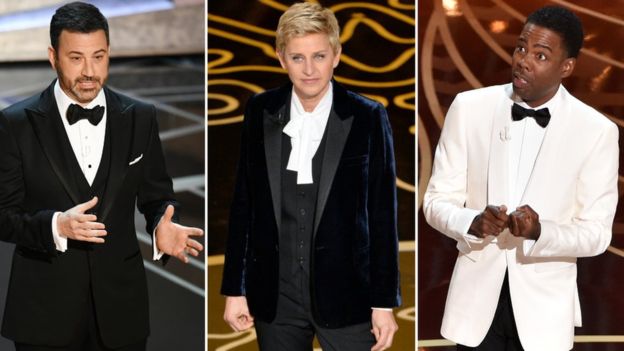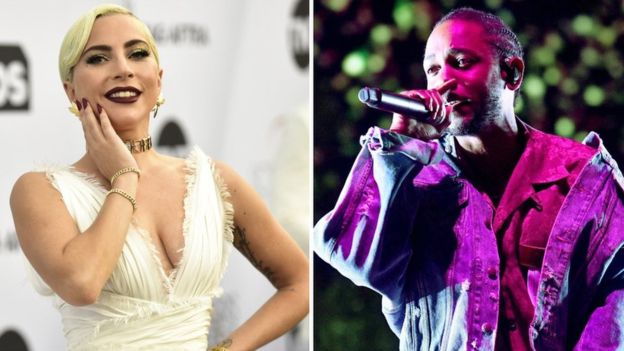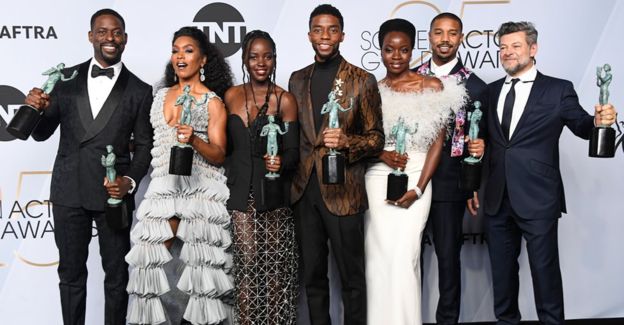
Every year, the public seem to be interested in everything to do with the Oscars. Except, that is, for the ceremony itself.
This year’s event takes place on Sunday night, but while most of us enjoy finding out who’s won best actress or best picture, fewer people than ever have been actually tuning in to watch the telecast.
Last year, the ceremony’s live audience was the lowest in in Oscars history, averaging 26.5 million viewers, down from 32.9 million in 2017.
The increased competition from streaming services will certainly have played a part – but it’s also likely to be audience fatigue at how bloated the three-and-a-half hour ceremony has become.
“The first Oscars took less than 10 minutes,” points out Scott Feinberg of The Hollywood Reporter, “which was obviously pre-television.
“Television came along, and networks paid a fortune for the Oscars, and as a result they expected a more complete kind of show.
“That meant no longer just handing out the awards but adding performance elements, so it became more telegenic, to include singing, dancing and comedy.”
Comedians like Chris Rock, Ellen DeGeneres and Jimmy Kimmel have recently hosted the show to keep the audience entertained between awards and with an opening stand-up routine.

There are also traditionally five musical performances from the best original song nominees.
But adding all these elements to the 24 categories means the telecast is just too long for some viewers to bear.
Consequently, the Academy had this year attempted to bring some changes to try and keep audiences tuning in – most significantly by shortening the length of the telecast to three hours.
But they’ve since had to row back on nearly all their time-saving decisions due to pressure from the film industry.
What were the proposals?
The Academy initially said that the winners of four of the categories would be announced during commercial breaks, with edited highlights being shown in the latter part of the telecast.
The prizes for cinematography, film editing, live-action short and makeup and hairstyling would have been given out while the audience at home is grabbing extra TV snacks.
But, suggests Feinberg: “That would’ve been really risky.
“During commercials, when people at the ceremony know they’re not live on the air, they run around and talk to people, go to the bathroom, be a little loud, and that could’ve come across as disrespectful to the winners who are getting their awards during that time.”
Several high-profile figures in the film industry, including Spike Lee, Seth Rogen and Martin Scorsese, also objected to the change.
So the Academy reinstated the categories, and told its members last week: “All awards will be presented without edits, in our traditional format.”
With the same number of categories to get through, the biggest time-saver may end up being the lack of a host.
After Kevin Hart’s departure, the Academy confirmed this year would instead just have a mixture of celebrities introducing individual categories.
Jennifer Lopez, Whoopi Goldberg, Daniel Craig, Awkwafina and Tina Fey are among those who the Academy will be hoping keep viewers at home engaged.
It means the opening monologue from the host will be skipped, also saving time, but it’s unlikely the ceremony will launch straight into handing out awards.
Karey Burke, the president of TV network ABC, which broadcasts the Oscars, says there is something special in the works to launch the ceremony.
“We have a very exciting opener planned. We are not going to go straight into people thanking their agents,” she said.
There will also be a tightening up of the rules around acceptance speeches.
At the Academy’s annual luncheon last month, nominees were told they’d have 90 seconds from the time their name is called until when their speech will need to be a concluded.
“It means you can hit the parties by 8:15,” Oscars producer Glenn Weiss pointed out.

Such changes might make the ceremony tighter, but those may not be the only things preventing viewers from tuning in.
In his 10-point plan to save the Oscars last year, Piers Morgan suggested the Academy should “slash the musical performances in half and get rid of the best song category”.
But the Academy confirmed it wouldn’t be cutting any of the songs – so this year’s nominees, including Lady Gaga, will perform as normal.
(They had initially flirted with the idea of only having a couple of the nominees perform, but this was another idea they quickly decided against after industry backlash.)
The only absentee from the best song performances will be Kendrick Lamar – who dropped out earlier this week due to logistical issues.
Artistic v popular
Not only will four of the best song nominees perform – but there will be a bonus musical performance Queen and Adam Lambert, the Academy announced last week.
They’re being included because one of the nominated films this year is the band’s biopic Bohemian Rhapsody.
Another of Morgan’s suggestions was: “Stop giving the best picture award to obscure films very few non-movie people actually see, like or understand.”
His last point referred to the number of small, arthouse films that have won in recent years at the expense of box office smashes.
In 2017, for example, the hugely popular La La Land, which grossed $440m (£334m), lost out to Moonlight, which took less than a fifth of that – $65m (£49m).
“If you look at the numbers over the years, the ratings closely correlate to the popularity of the best picture nominees, because then people feel they have a rooting interest in the outcome,” says Feinberg.
“Last year, it’s not surprising the ratings took a hit because Three Billboards and The Shape of Water were not the films the audiences were going to in big numbers.
“If they’d nominated something like Wonder Woman, I think the numbers probably would’ve been a little better. This year, they have a lot riding on Black Panther.
“It’s important for ABC, the Academy, Disney, that Black Panther not be snubbed.”
Black Panther’s popularity is perhaps one of the reasons the Academy attempted to introduce a new category this year to recognise more box office hits.

Last August, it announced the introduction of the popular film category, which Black Panther would not only have definitely been nominated for, but would most likely have also won.
But this turned out to be another decision they would backtrack on – blaming the complications of introducing a new category so late in the year, when studios hadn’t had time to prepare or target their promotional campaigns towards awards season.
It also would’ve meant yet another category to get through on the night – and most agree the Academy certainly doesn’t need any more of those.
“Over the years the number of categories at the Oscars has grown,” says Feinberg, “and it’s much easier to add categories than it is to take them off the air.
“And that’s because once a category is on the air, the people who would be affected by it don’t want to lose that potential air time for their area of work.”
Keeping the Oscars both short and entertaining is a surprisingly tall order in this day and age of short attention spans.
All eyes will be on Hollywood on Sunday night to find out whether they can pull it off.
–
Source: BBC













